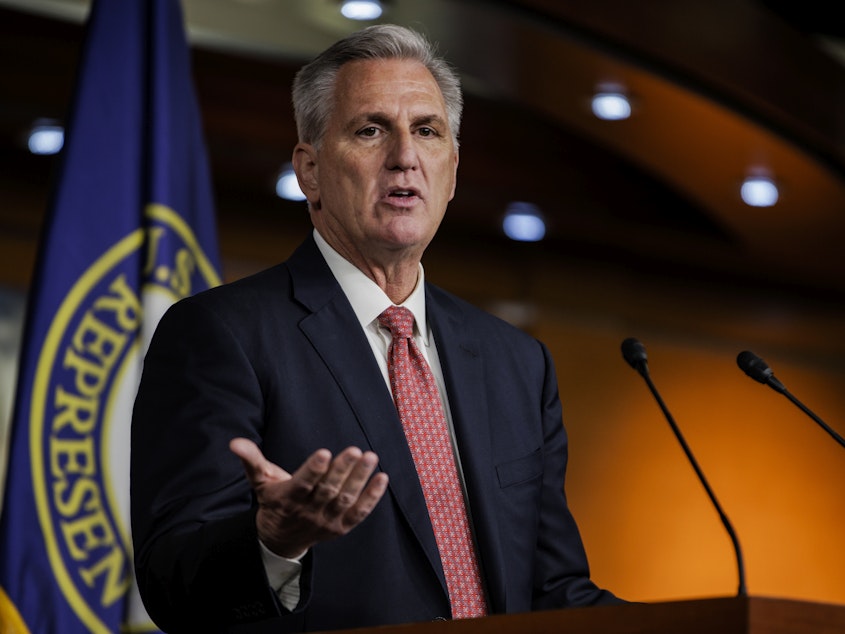Audio reveals Kevin McCarthy planned to urge Trump to resign after Capitol riot

U.S. House Minority Leader Kevin McCarthy had planned to get former President Donald Trump to resign after the Jan. 6 riot at the Capitol, The New York Times revealed in an audio recording Thursday.
In the recorded conversation, McCarthy, a Republican, reportedly told a group of Republican leaders that he didn't believe Trump would voluntarily step down, and contemplated rallying Congress to have him impeached a second time, saying that he believed the measure would pass both the House and Senate.
Updated April 22, 2022 at 10:23 AM ET
"I'm seriously thinking of having that conversation with him tonight," McCarthy said. "From what I know of him — I mean, you guys know him too — do you think he would ever back away?"
McCarthy said he would alert the former president of his plans to begin an impeachment trial if he did not resign.
Sponsored
"I think this will pass, and that would be my recommendation you should resign," McCarthy said. "That would be my take, but I don't think he would take it, but I don't know."
McCarthy had previously denied having the conversation, saying that an earlier New York Times report was "totally false and wrong." However the audio, which seems to corroborate the story, was later released by NYT journalists Jonathan Martin and Alexander Burns, authors of new book This Will Not Pass, an account of the 2020 election.
In the recording, the then-No. 3 House Republican Liz Cheney can be heard asking McCarthy about whether a 25th amendment succession plan could be triggered and about Trump's possible resignation.
A Cheney spokesman said Friday morning that the House select committee to investigate the Jan. 6 Capitol attack "has asked Kevin McCarthy to speak with us about these events but he has so far declined. Representative Cheney did not record or leak the tape and does not know how the reporters got it."
In January, the committee asked McCarthy to appear and share more about his interest to have Trump resign. However, McCarthy swiftly rejected the idea of testifying.
Sponsored
Trump eventually faced an impeachment charge for inciting an insurrection a week after the riot. During that time, a majority of senators voted to convict Trump — 57 to 43, including seven Republicans. But two-thirds, or 67 votes, was needed to convict. It was the second time Trump was acquitted in an impeachment trial.
In 2019, articles of impeachment were brought against Trump for the first time for abuse of power and obstruction of Congress, but he was also acquitted.
Tensions had been high between McCarthy and Trump on Jan. 6
McCarthy and Trump had a shouting match during a phone call during the Jan. 6 attack, where McCarthy pleaded with Trump to take notice that the rioters were Trump supporters. However, Trump responded, "Well, Kevin, I guess these people are more upset about the election than you are."
Days later, McCarthy took to the House floor later to say Trump "bears responsibility" for his role in the attack. The rift appeared it would stay — until McCarthy flew to Trump's Mar-a-Lago resort in Florida within weeks of the attack and appeared in a photo with Trump, seemingly mending this feud between them.
Sponsored
The recording puts McCarthy in a tough position with his party. In the wake of the news, he received mixed reviews from his rank and file.
"@GOPLeader - you should have trusted my instincts, not your own," Florida GOP Rep. Matt Gaetz tweeted Friday.
However, Trump likely remains the ultimate judge on McCarthy's ambitions. And with mended fences in their past already, it's very possible McCarthy can survive a new controversy. [Copyright 2022 NPR]



